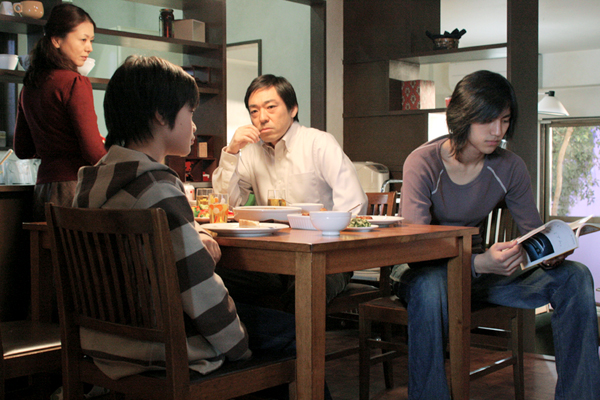|
Reviews of Recent Independent, Foreign, & Documentary Films in Theaters and DVD/Home Video

TOKYO SONATA
There are possibly millions like 46-year-old Ryuhei all over the world who have lost their livelihoods and now have to start their careers all over again, particularly in America, where unemployment is alarmingly high. So the plot is not specific only to Tokyo, where Ryuhei (Teruyuki Kagawa) pretends he’s still goes to work everyday, dressed in suit and tie, weeks after he has been laid-off from his managerial white-collar job. Ironically, the film works as a kind of ironic escapism: you may not want to see a story like this, but it’s so well told that it stands as a near-great testament to the times. It’s not just the reflection of current events that makes Tokyo Sonata work so powerfully as a drama, but also the fully-fleshed out characters, which are almost out of a Yasujiro Ozu film. The firm father has insecurity and fear on his face from the get-go, and he hides it almost too well from his family. He maintains his secret by sticking to the parts of town where other out-of-work folk hangout during the day. Meanwhile, his two sons have secrets, too. His youngest, Kenji, defies his father’s piano playing ban, and with his lunch money, Kenji pays for lessons without his parents’ knowledge and quickly becomes a prodigy. Fresh out of high school, the oldest son, Takashi (Yu Koyanagi), has little direction and decides to inexplicably join the military—the U.S. military—without telling his parents. Housewife Megumi (Kyoko Koizumi) doesn’t seem to ever leave the traditionalist home—she always has dinner ready when Ryuhei comes home, and doesn’t begin to eat until after he takes a bite. That is until a bizarre and unexpected existential journey in the second half. By this point, the change in tone may be almost too unsettling, melodramatic, and surreal, if only for how deceptively simple the film before has been. Indeed, this is one of Kurosawa’s chief themes, deception. But moments throughout, like a horrifying scene where Ryuhei is forced to sing karaoke at a job interview, build to the volcanic final 40 minutes, where Ryuhei, Megumi, and Kenji become extraordinarily undone. And
on top of the light touches and contradictions of the script’s everyday
tragedies, Kurosawa coaxes some amazing performances. His two leads, Kagawa and Koizumi,
in countless instances affect
us without seemingly doing very much, even when they are unsympathetic,
and Kai Inowaki as Kenji helps to make the final scene so heart-rending
that it will potentially move you to tears. Jack Gattanella
|

